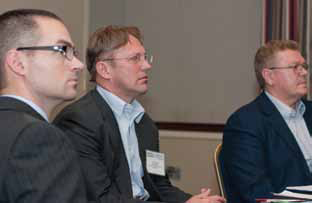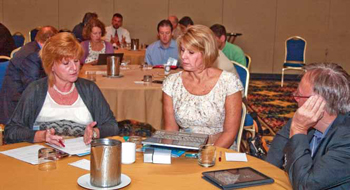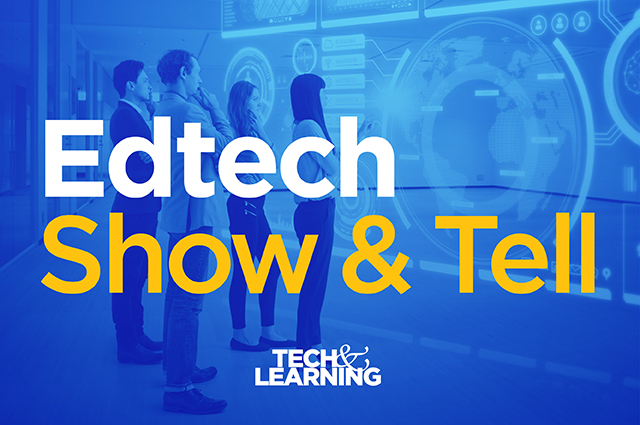The Content

Tools and ideas to transform education. Sign up below.
You are now subscribed
Your newsletter sign-up was successful
Ben Grey,
Chief Information Officer,
Oak Lawn-Hometown
District 123
Oak Lawn, IL
Dr. Art Fessler, Superintendent,
Oak Lawn- Hometown

District 123
Tools and ideas to transform education. Sign up below.
Oak Lawn, IL
Dr. Kevin Anderson,
Superintendent of Schools,
Elmwood Park CUSD 401 Elmwood Park, ILThe printed textbook is a dying breed. Not much will be gained by replacing it with a digital clone. Online resources offer enormous opportunities for districts that now need to transition from a static single source of knowledge to dynamic repositories of powerful learning objects created and selected by the teachers and students who will use them.
[The scenario]
On the first day of school, Ms. Mahdavi asks her ninth graders to open the curriculum for her science course. The learners touch the screens of their mobile devices, clicking through the school’s Web site into their teacher’s curriculum space, eager to access the articles, videos, interactive simulations, student projects, and recommendation-driven learning tools that will help them master skills. Some of the learners immediately start working on their digital profiles, setting up space for their portfolios and peer evaluation of their ongoing work. Before they get very far, Ms. Mahdavi says, “Eyes up” and strategizes with them about finding collaboration partners both local and global, and reviews the school’s copyright policies before class members begin adding content to the growing archive housed within the curriculum space.
[Executive Summary]
In several of the districts and states that participated in the digital-content working group, a collaborative effort to create digital alternatives to textbooks is under way. These efforts go far beyond simply converting from paper to screen.
With digitized curriculum, content can now come from many sources. For example, in Georgia’s Forsyth County Schools, educators have been compiling an extensive collection of standardsaligned “learning objects” ranging from their own most successful lesson plans to videos, articles, simulations, and engaging interactive content from subscription services. A textbook publisher is now on board, unbundling its content to serve as additional learning objects in Forsyth’s individualized system. A similar effort is under way in the Burlington Public Schools in Massachusetts, where educators are collaborating in the creation of e-pubs that will run on the iPads used in the district’s new one-toone program.
Debbie Rice, Director of Technology,

Auburn City Schools, AL
Cristen Herring, Assistant Superintendent,
Auburn City Schools, Auburn, AL
David Warlick Not only does the shift to digital content give teachers a new say in what and how to teach, it also opens opportunities for students to lead the way. In New Hampshire, where a statewide conversation about digital content and other technology trends is taking place, education leaders take very seriously the research indicating that students want to be able to use their own mobile devices at school, access online content previously blocked by filters, and conduct real research as part of their learning. That’s what’s happening in the New Canaan Schools in Connecticut, where student-centered learning involving social media plays a key role in the curriculum. During the recent “Arab Spring” uprisings, for example, high school students followed Twitter postings from individual countries and reported on the latest developments, thus creating a dynamic living textbook about current events.
As members of the working group shared examples of local and regional initiatives focused on digital content, they acknowledged the challenges they have had to address. A thorough understanding of copyright issues, from fair use to creative commons licensing, is essential to the success of such endeavors. So is the willingness to work collaboratively, rather than competitively, with peers in other classrooms, districts, and states. In the end, however, all were in agreement that this is the direction in which we must move to prepare our students for the future.
What They Said
“We want to see a return on learning. That is the most satisfying part. We partnered with a publisher, but we also wish to see how much content we can create on our own. We want to ‘un-chunk’ the content and deliver it in more relevant ways. In the digital realm, it’s all about sharing. Power shared is power multiplied.”
—Bailey Mitchell, chief technology & information officer, Forsyth County Schools, GA
“We want to sponsor sharing in our district. Some school districts are very reluctant to share content and ideas. We need to stop being competitive and proprietary, but there’s a lot of history that makes it hard to do. It’s a new skill we need to learn; it involves changing how we’ve thought for a long time.”
— Eric Conti , superintendent of schools, Burlington Public Schools, MA
“We are already in the 21st century. We know that we want to create a digital learning environment, but what should it look like? It’s not just about PD or data or which devices to use for one-to-one. If we ask the important questions and look as far ahead as possible, maybe we’ll get halfway there.”
— Cathy Higgins, state educational technology director, Concord, NH
“We tell our teachers, ‘We didn’t bring you here to teach but instead to create learning.’ Learning does not happen to you but rather inside you.”
—Ken Wallace, superintendent of schools, Maine Township High School District, IL
Working Group Take-Aways
What do students want?
Online textbooks should include the ability to:

• download to my personal device
• make highlights or notes
• print
• search
• use animations and simulations
• use a calculator and dictionary
• access useful web links
• take tests and quizes on my own
* SOURCE: Cathy Higgins, State Educational Technology Director, NH
Find more take-aways from the School CIO summit in the program vault under schoolcio.com (click on “Events”).
[Participants]
Nancy Caramanico
Instructional technology specialist
Media, PA
Eric Conti
Superintendent of schools
Burlington Public Schools, MA
Cathy Higgins
State educational technology director
Concord, NH
Patrick Larkin
Principal
Burlington Public Schools, MA
Robert Miller
Director of information and communication technologies
New Canaan Public Schools, CT
Bailey Mitchell
Chief technology & information officer
Forsyth County Schools, GA
Henry Thiele
Chief technology officer
Maine Township High School District, IL
Ken Wallace
Superintendent of schools
Maine Township High School District, IL
David Warlick
Keynoter, author and programmer
Raleigh, NC
